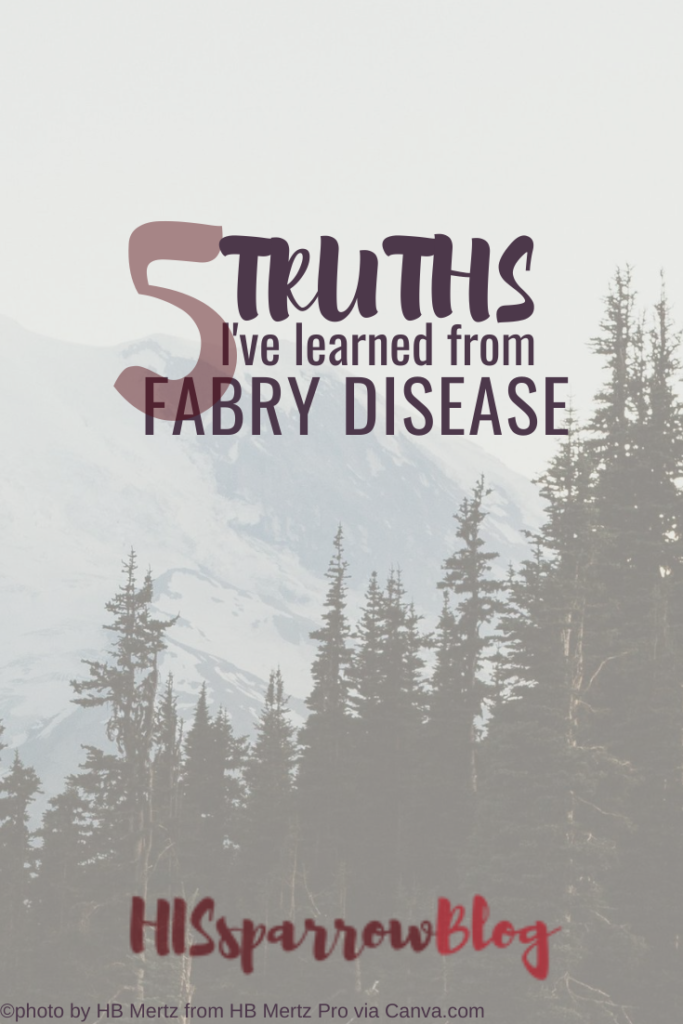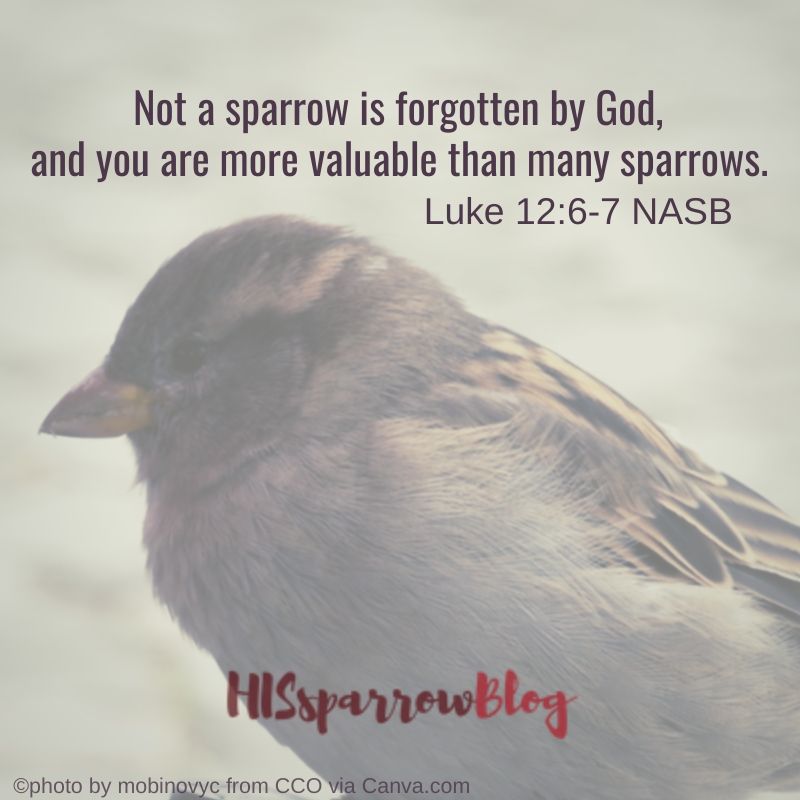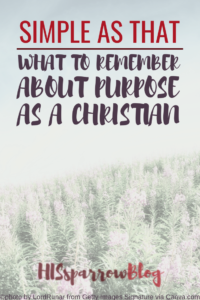Do you have a chronic illness? It ain’t no picnic, is it? There are good days and bad days as they say, and sometimes the bad days color the good ones. But I think there is a lot we can learn. At least I’ve learned a lot from my own chronic illness: Fabry disease (pronounced fah-bray).
What is Fabry disease?
It’s a rare lysosomal storage disorder that’s carried on the X chromosome. The body doesn’t produce enough of a particular enzyme (alpha-galactosidase A) to break down a certain protein (GL-3), which leads to a build-up in the cells of the body.
This build-up causes all kinds of symptoms. I won’t get into all of them right now, but they range from minor (as in non-life threatening) to major: from hand/feet pain and heat/cold intolerance all the way to kidney and heart failure.
I’ve known about this disease since I was about five years old when my ophthalmologist saw the sign called corneal whorling in my eyes.
Yes, you read that right: my ophthalmologist.
Thanks to his miraculous knowledge in a time when most doctors had never even heard of Fabry, he got the health-care ball rolling for my family.
It’s been a long road.
My family and I have been dealing with Fabry disease for thirty years now and counting. A lot has happened in that time with downs and ups. Here’s the simplified, highlighted version:
- No treatment—or cure—was available or even in sight.
- It was believed that females were only carriers of Fabry.
- My dad and uncle received kidney transplants from their brothers in 1994. My brother and I spent a lot of that school year, it seemed, with our grandparents.
- My dad had several procedures and surgeries including spleen removal.
- Advances were made in understanding Fabry (like the fact that women are not carriers but can have more unpredictable symptoms).
- My uncle passed away.
- My dad and I started enzyme replacement therapy (ERT) in 2003/2004. It’s an IV-infusion therapy administered every two weeks.
- My dad received a pacemaker/defibrillator, and then had heart surgery.
- My dad died in 2015. He lived probably twenty years longer than anyone expected thanks to ERT and all the care from his doctors.
- I started a drug trial for an oral medication in 2019 with several other options also in trials. Instead of a focus on extension of life, like my dad had in his day, companies are now exploring treatment options for better quality of life.

What I’ve Learned from Living With Fabry Disease
#1 – Don’t judge others.
If you have a chronic illness, there are two things you constantly ask yourself: how much energy will this take and how long will the recovery time be?
Always. Whether it’s for a cleaning spree at home, a fun outing with family and friends, or helping someone.
I think sometimes that unless they live with me other people may think I’m faking. It may appear that I make time for what I want to do, which is probably true in the sense that we all do that to some degree, but there’s a price to expending energy. Others sometimes don’t get to see my recovery time.
This makes me wonder what else could be going on in another’s life that I can’t see.
#2 – I’m not the only one.
Chronic illness can have a huge impact on entire families, but it can still make you feel alone. Like you’re the only one who wonders how long your lifespan will be and what your quality of life will be like.
For a long time I envied other people’s carefree energy, and then I’d imagine myself in their shoes. What could I do if I could live my life without carefully evaluating my energy levels?
The stuff I could get done.
I’m not exactly sure when, but one day it hit me that we all have stuff to deal with. She has crippling asthma and sometimes has trouble walking across the grocery store parking lot. He has debilitating arthritis.
And other people get tired, too. You don’t need a chronic illness to reach exhaustion.
#3 – I’m not too small. Or insignificant.
I mentioned a couple times that Fabry disease is considered a rare disease. That means it affects 5-6% of the population.
According to the numbers, Fabry patients are a very small percentage in the grand scheme of diseases. Cancer and Alzheimer’s and asthma. Yet treatments are being made available to us.
And there was a time that experts didn’t think women were even affected the same as males with Fabry. They thought we were just carriers of the disease.
I was considered to be a carrier with symptoms when I was a little girl. I’m in my thirties now, and it’s been years since that amazing leap in understanding Fabry was made, but sometimes I still feel insignificant.
I feel like I’m just a female. Not as significant as the classic-Fabry male. Or as the many other diseases out there waiting for cures. I’m learning, though, that I am significant.
I’m like that little starfish on the beach that the sweet-hearted little boy is trying his hardest to save. Picking up as many as he can and chunking them back to the waves. All in the hopes of making a difference in even one life.

#4 – Do a little at the time.
There’s so much that I want and need to do, and frustration can quickly overwhelm me when I’m down.
Since I don’t feel I can do everything, sometimes I do nothing. But I’ve found that when I keep on keeping on—when I do a little at the time—it adds up.
#5 – Jesus is the only thing we can rely on—not even our own minds.
I don’t know how much time I have on this earth. I don’t know what kind of quality of life I will experience.
Seeing my dad’s struggle and how his mind was affected probably scares me more than most things about Fabry. The thought of not being able to trust my own mind…
My story is not my dad’s—although they are so closely linked. I’ve been on treatment for most of my life now. I’ve already been given more chance than he had.
Regardless, God is in control. He sees my days. He will neither leave me nor forsake me.

Chronic illness can be overwhelming sometimes. It can be hard and confusing and discouraging, but there’s a lot that our valleys can teach us. We are not insignificant, and we are not the only ones struggling. And even more, we have a beautiful view of God’s care for us through our weaknesses.
How about you? Do you have a chronic illness? What have you learned from it? Let me know in the comments below.
Be sure to check out these resources, too…
- Chronic Illness: My Story from HISsparrowBlog
- Fabry Disease: The Story Continues from HISsparrowBlog
- FSIG – Fabry Support and Information Group
- NORD – National Organization for Rare Disorders
- Fabry Disease News
- National Fabry Disease Foundation
- ReThink Fabry (Resources and Support)
- Mindfully Rare (Mental Health Support)






I enjoy all of your posts, but this one is exceptional. You are so right! God will never leave nor forsake us. No one knows what lies ahead for them. It may be a blessing to have the chance to be thankful for things others take for granted.
The movie ‘God’s Not Dead’ had a quote that’s stuck with me: “Sometimes the devil allows people to live a life free of trouble because he doesn’t want people turning to God. Their sin is like a jail cell, except it is all nice and comfy and there doesn’t seem to be any reason to leave. The door’s wide open. Till one day time runs out and the door slams shut and suddenly it’s too late.” I am thankful for anything that turns me to Jesus and reminds me of His great love for me. Thank you so much for your encouragement and support!
You’re so right! Some have illnesses we can’t see on the outside of their bodies and it is easy to judge. My husband has bipolar disorder. Even though great strides have been made, it is still baffling – even to me, though he has now been struggling with it for over 30 years.
But God! He has promised to never leave or forsake us, and He hasn’t.
Hidden illnesses can have their own kind impact if others discount our experiences. I can’t imagine what your husband has faced with bipolar disorder, but I love how you remember that God is always with us. God bless!
Thank you for sharing and being so vulnerable. I’ve only recently been diagnosed with fibromyalgia and I’m learning to be more patient with myself. It can be difficult not to judge myself based on what I used to be able to do with ease.
I hope today was a good day.
Peace and grace,
Tammy
Oh, my goodness! I’m sorry, Tammy. A new diagnosis can be really hard to deal with. I always say I’m blessed that I’ve known about Fabry disease since I was five—it’s never really been something that required huge changes later in life when it’s more difficult. I’ve grown up with many helpful habits like limiting salt intake and the pain always been there. You brought up an excellent point: it can be easy to judge ourselves for what we could do before. I think this all the time! And wonder to myself why some things seem so much harder now that I could do just a few years ago. Thanks for stopping in, Tammy!
I had never heard of this disease before today. Thank you for educating us with such tact and grace. Pinned.
Thank you, Sarah!
I did not know anything about Fabry disease. I suffer from a chronic pain disease as well. I know what it is like to suffer from a disease that many people do not understand, and can not see. Sometimes you do feel alone, but I know that God is there with me every step of the way. Thank you so much for sharing your story.
I am not surprised at all that you’ve never heard of Fabry. 😉 Most people haven’t. I’m sorry you’re dealing with chronic pain. Chronic pain can be difficult on so many levels. I’m so glad you are trusting God through your pain. God IS with us every step of the way. God bless, Angela.